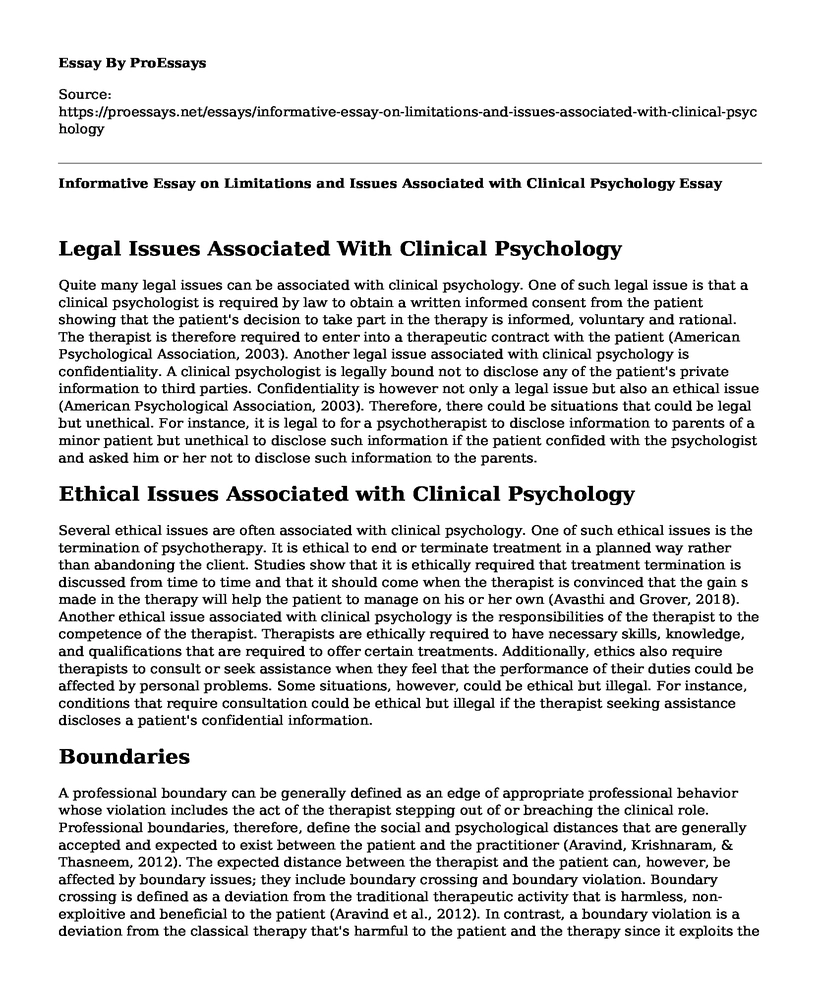Legal Issues Associated With Clinical Psychology
Quite many legal issues can be associated with clinical psychology. One of such legal issue is that a clinical psychologist is required by law to obtain a written informed consent from the patient showing that the patient's decision to take part in the therapy is informed, voluntary and rational. The therapist is therefore required to enter into a therapeutic contract with the patient (American Psychological Association, 2003). Another legal issue associated with clinical psychology is confidentiality. A clinical psychologist is legally bound not to disclose any of the patient's private information to third parties. Confidentiality is however not only a legal issue but also an ethical issue (American Psychological Association, 2003). Therefore, there could be situations that could be legal but unethical. For instance, it is legal to for a psychotherapist to disclose information to parents of a minor patient but unethical to disclose such information if the patient confided with the psychologist and asked him or her not to disclose such information to the parents.
Ethical Issues Associated with Clinical Psychology
Several ethical issues are often associated with clinical psychology. One of such ethical issues is the termination of psychotherapy. It is ethical to end or terminate treatment in a planned way rather than abandoning the client. Studies show that it is ethically required that treatment termination is discussed from time to time and that it should come when the therapist is convinced that the gain s made in the therapy will help the patient to manage on his or her own (Avasthi and Grover, 2018). Another ethical issue associated with clinical psychology is the responsibilities of the therapist to the competence of the therapist. Therapists are ethically required to have necessary skills, knowledge, and qualifications that are required to offer certain treatments. Additionally, ethics also require therapists to consult or seek assistance when they feel that the performance of their duties could be affected by personal problems. Some situations, however, could be ethical but illegal. For instance, conditions that require consultation could be ethical but illegal if the therapist seeking assistance discloses a patient's confidential information.
Boundaries
A professional boundary can be generally defined as an edge of appropriate professional behavior whose violation includes the act of the therapist stepping out of or breaching the clinical role. Professional boundaries, therefore, define the social and psychological distances that are generally accepted and expected to exist between the patient and the practitioner (Aravind, Krishnaram, & Thasneem, 2012). The expected distance between the therapist and the patient can, however, be affected by boundary issues; they include boundary crossing and boundary violation. Boundary crossing is defined as a deviation from the traditional therapeutic activity that is harmless, non-exploitive and beneficial to the patient (Aravind et al., 2012). In contrast, a boundary violation is a deviation from the classical therapy that's harmful to the patient and the therapy since it exploits the patient. According to Aravind et al. boundaries have some effects on therapeutic relationships. For instance, the existence of clear professional boundaries promotes safety for patients, physicians, and the society. Boundaries create clear roles for physicians while defining therapeutic territories and ensuring that patient-physician relationship is not undermined.
Cultural Limitations
There are some cultural limitations associated with treatment and assessment. One of the limitations is multiculturalism or cultural diversity of the American population. It is crucial for psychologists to acknowledge and incorporate different cultures into their theories and therapies during assessment and treatment with the aim of protecting patients from non-dominant cultures against feeling lost, displaced or mystified. Psychologists, however, find it challenging to incorporate all cultures due to the complexity and cultural diversity of the American population (Pomerantz, 2014). Another cultural limitation associated with treatment and assessment according to Pomerantz is the lack of cultural competence among therapists. It is often expected that therapists or psychologist should be culturally competent for a better therapeutic outcome. It is however difficult for therapists to be culturally competent since the American population is culturally diverse. The lack of multicultural competence among therapists, therefore, hinders better assessment and treatment of patients from diverse cultures (Pomerantz, 2014). Due to multiculturalism and lack of cultural competence among therapists, different assessment instruments, therapy techniques or research findings may be applied to individuals from varying cultures. The instruments, therapy techniques, and research results may not conform to the patient's culture and values and therefore potentially harming and causing significant cultural implications.
References
American Psychological Association. (2003). Legal Issues in the professional practice of psychology. Professional Psychology: Research and Practice, 34(6), 595-600. doi:10.1037/0735-7028.34.6.595
Avasthi, A., & Grover, S. (2013). Ethical and legal issues in psychotherapy .
Krishnaram, V., Aravind, V., & Thasneem, Z. (2012). Boundary crossings and violations in clinical settings. Indian Journal of Psychological Medicine, 34(1), 21. doi:10.4103/0253-7176.96151
Pomerantz, A. M. (2014). Clinical Psychology: Science, Practice, and Culture, Third Edition: DSM-5 Update.
Cite this page
Informative Essay on Limitations and Issues Associated with Clinical Psychology. (2022, Feb 12). Retrieved from https://proessays.net/essays/informative-essay-on-limitations-and-issues-associated-with-clinical-psychology
If you are the original author of this essay and no longer wish to have it published on the ProEssays website, please click below to request its removal:
- Link Between Violence and Mental Disorder Essay
- Relationship Between Depression and Socioeconomic Status Annotated Bibliography
- I Am What I Say: How One Book Changed the Way I See the World
- Witnessing Death: Realizing the Complexity & Impact of Illnesses - Essay Sample
- Essay Sample on Americans Unite on Inalienable Rights: A Collective Emphasis on Common Good
- Case Study Sample on Mr. Moore Arrested & Charged Despite No Grounds: Conviction Reversed
- Free Paper Sample: Gender and Justice in "A Jury of Her Peers by Susan Glaspell"







